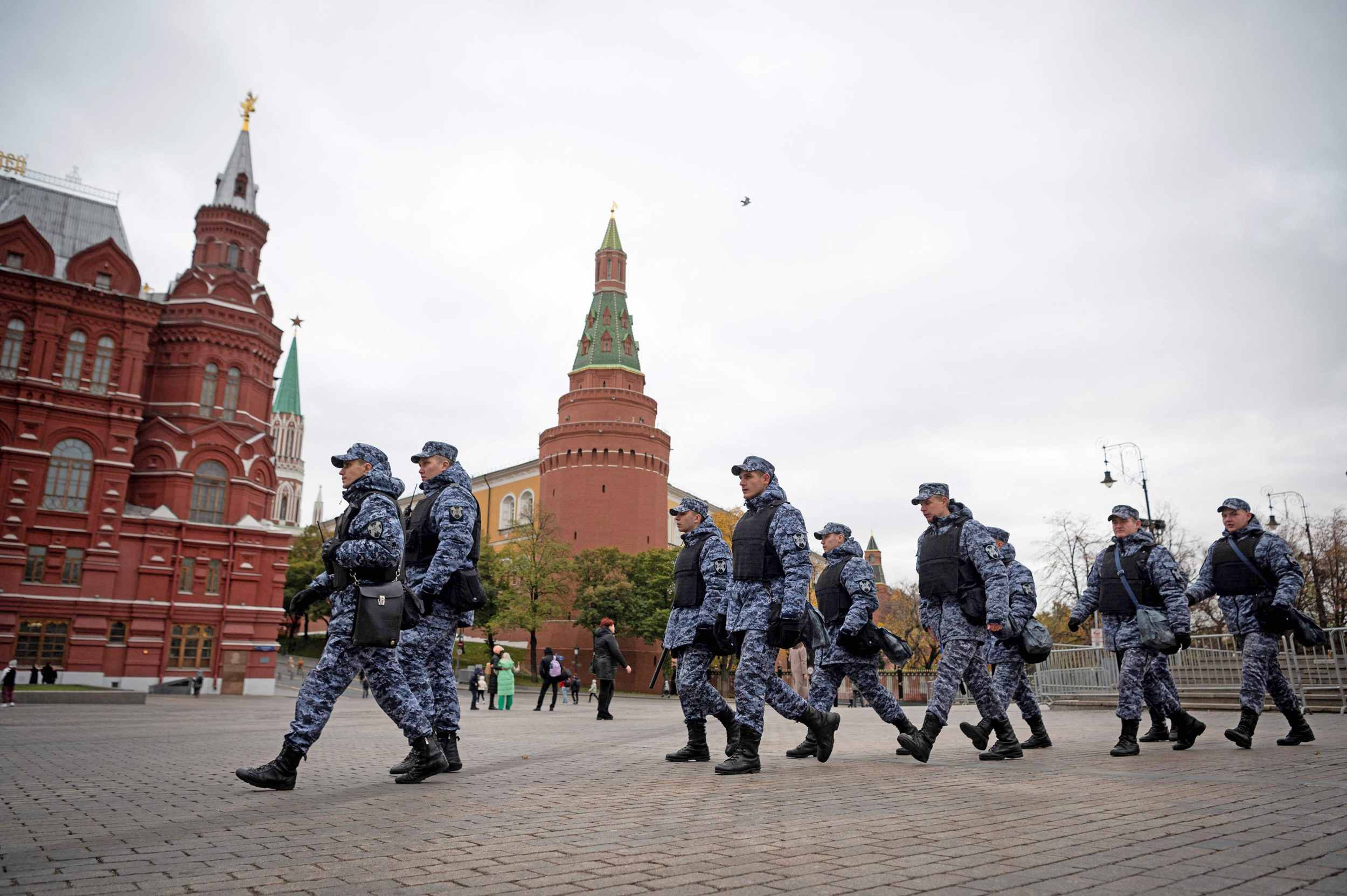Day: June 4, 2024
On June 6, 1944, the British found themselves suddenly and irrevocably overtaken by their former colony.

Robert Capa / Magnum

Listen to this article
Produced by ElevenLabs and News Over Audio (NOA) using AI narration.
For most Americans, D-Day remains the most famous battle of World War II. It was not the end of the war against Nazism. At most, it was the beginning of the end. Yet it continues to resonate 80 years later, and not just because it led to Hitler’s defeat. It also signaled the collapse of the European empires and the birth of an American superpower that promised to dedicate its foreign policy to decolonization, democracy, and human rights, rather than its own imperial prestige.
It is easy to forget what a radical break this was. The term superpower was coined in 1944 to describe the anticipated world order that would emerge after the war. Only the British empire was expected to survive as the standard-bearer of imperialism, alongside two very different superpower peers: the Soviet Union and the United States. Within weeks of D-Day, however, the British found themselves suddenly and irrevocably overruled by their former colony.
That result was hardly inevitable. When the British and the Americans formally allied in December 1941, the British empire was unquestionably the senior partner in the relationship. It covered a fifth of the world’s landmass and claimed a quarter of its people. It dominated the air, sea, and financial channels on which most global commerce depended. And the Royal Navy maintained its preeminence, with ports of call on every continent, including Antarctica.
The United States, by contrast, was more of a common market than a nation-state. Its tendency toward isolationism has always been overstated. But its major foreign-policy initiatives had been largely confined to the Western Hemisphere and an almost random collection of colonies (carefully called “territories”), whose strategic significance was—at best—a point of national ambivalence.
In the two years after Pearl Harbor, the British largely dictated the alliance’s strategic direction. In Europe, American proposals to take the fight directly to Germany by invading France were tabled in favor of British initiatives, which had the not-incidental benefit of expanding Britain’s imperial reach across the Mediterranean and containing the Soviet Union (while always ensuring that the Russians had enough support to keep three-quarters of Germany’s army engaged on the Eastern Front).
Things changed, however, in November 1943, when Winston Churchill and Franklin D. Roosevelt held a summit in Cairo. The British again sought to postpone the invasion of France in favor of further operations in the Mediterranean. The debate quickly grew acrimonious. At one point, Churchill refused to concede on his empire’s desire to capture the Italian island of Rhodes. George Marshall, the usually stoic U.S. Army chief of staff, shouted at the prime minister, “Not one American is going to die on that goddamned beach!” Another session was forced to end abruptly after Marshall and his British counterpart, Sir Alan Brooke, nearly came to blows.
With the fate of the free world hanging in the balance, a roomful of 60-year-old men nearly broke out into a brawl because by November 1943, America had changed. It was producing more than twice as many planes and seven times as many ships as the whole British empire. British debt, meanwhile, had ballooned to nearly twice the size of its economy. Most of that debt was owed to the United States, which leveraged its position as Britain’s largest creditor to gain access to outposts across the British empire, from which it built an extraordinary global logistics network of its own.
From the April 2023 issue: The age of American naval dominance is over
Having methodically made their country into at least an equal partner, the Americans insisted on the invasion of France, code-named “Operation Overlord.” The result was a compromise, under which the Allies divided their forces in Europe. The Americans would lead an invasion of France, and the British would take command of the Mediterranean.
Six months later, on June 6, 1944, with the D-Day invasion under way, the British empire verged on collapse. Its economic woes were exacerbated by the 1.5 million Americans, and 6 million tons of American equipment, that had been imported into the British Isles to launch Operation Overlord. Its ports were jammed. Inflation was rampant. Its supply chains and its politics were in shambles. By the end of June 1944, two of Churchill’s ministers were declaring the empire “broke.”
The British continued to wield considerable influence on world affairs, as they do today. But after D-Day, on the battlefields of Europe and in international conference rooms, instead of setting the agenda, the British found themselves having to go along with it.
In July 1944, at the Bretton Woods Conference, the British expectation that global finance would remain headquartered in London and transacted at least partially in pounds was frustrated when the International Monetary Fund and what would become the World Bank were headquartered in Washington and the dollar became the currency of international trade. In August 1944, America succeeded in dashing British designs on the eastern Mediterranean for good in favor of a second invasion of France from the south. In September 1944, the more and more notional British command of Allied ground forces in Europe was formally abandoned. In February 1945, at a summit in Yalta, Churchill had little choice but to acquiesce as the United States and the Soviet Union dictated the core terms of Germany’s surrender, the division of postwar Europe, and the creation of a United Nations organization with a mandate for decolonization.
How did this happen so quickly? Some of the great political historians of the 20th century, such as David Reynolds, Richard Overy, and Paul Kennedy, have chronicled the many political, cultural, and economic reasons World War II would always have sounded the death knell of the European imperial system. Some British historians have more pointedly blamed the Americans for destabilizing the British empire by fomenting the forces of anti-colonialism (what D. Cameron Watt called America’s “moral imperialism”).
Absent from many such accounts is why Britain did not even try to counterbalance America’s rise or use the extraordinary leverage it had before D-Day to win concessions that might have better stabilized its empire. The French did precisely that with far less bargaining power at their disposal, and preserved the major constituents of their own empire for a generation longer than the British did. The warning signs were all there. In 1941, Germany’s leading economics journal predicted the rise of a “Pax Americana” at Britain’s expense. “England will lose its empire,” the article gloatingly predicted, “to its partner across the Atlantic.”
The American defense-policy scholar and Atlantic contributing writer Kori Schake recently made a persuasive case that Britain came to accept the role of junior partner in the Atlantic alliance, rather than seek to balance American power, because the two countries had become socially, politically, and economically alike in all the ways that mattered. Britain, in other words, had more to lose by confrontation. And so it chose friendship.
The argument makes sense to a point, especially given how close the United Kingdom and the United States are today. But the remembered warmth of the “special relationship” in the 1940s is largely a product of nostalgia. British contempt for American racism and conformist consumerism seethed especially hot with the arrival in the U.K. of 1.5 million Americans. And American contempt for the British class system and its reputation for violent imperialism equally made any U.S. investment in the war against Germany—as opposed to Japan—a political liability for Roosevelt.
The British elite had every intention of preserving the British empire and European colonialism more generally. In November 1942, as Anglo-American operations began in North Africa, Churchill assured France that its colonies would be returned and assured his countrymen, “I have not become the King’s First Minister in order to preside over the liquidation of the British Empire.”
The British assumed that America’s rise was compatible with that goal because they grossly miscalculated American intentions. This was on stark display in March 1944, just over two months before D-Day, when Britain’s Foreign Office circulated a memorandum setting out the empire’s “American policy.” Given how naive the Americans were about the ways of the world, it said, Britain should expect them to “follow our lead rather than that we follow theirs.” It was therefore in Britain’s interest to foster America’s rise so that its power could be put to Britain’s use. “They have enormous power, but it is the power of the reservoir behind the dam,” the memo continued. “It must be our purpose not to balance our power against that of America, but to make use of American power for purposes which we regard as good” and to “use the power of the United States to preserve the Commonwealth and the Empire, and, if possible, to support the pacification of Europe.”
It is easy to see why members of Britain’s foreign-policy elite, still warmed by a Victorian afterglow, might discount Americans’ prattling on about decolonization and democracy as empty wartime rhetoric. If anything, they thought, Americans’ pestering insistence on such ideals proved how naive they were. Churchill often grumbled with disdain about Americans’ sentimental affection for—as he put it—the “chinks” and “pigtails” fighting against Japan in China, scornful of the American belief that they could be trusted to govern themselves.
And the face America presented to London might have compounded the misapprehension. Roosevelt was expected to choose George Marshall to be the American commander of Operation Overlord, a position that would create the American equivalent of a Roman proconsul in London. Instead, he picked Dwight Eisenhower.
Roosevelt’s reasons for choosing Eisenhower remain difficult to pin down. The president gave different explanations to different people at different times. But Eisenhower was the ideal choice for America’s proconsul in London and Europe more generally, if the goal was to make a rising American superpower seem benign.
Eisenhower had a bit of cowboy to him, just like in the movies. He was also an Anglophile and took to wearing a British officer’s coat when visiting British troops in the field. He had a natural politician’s instinct for leaving the impression that he agreed with everyone. And he offered the incongruous public image of a four-star general who smiled like he was selling Coca-Cola.
He was also genuinely committed to multilateralism. Eisenhower had studied World War I closely and grew convinced that its many disasters—in both its fighting and its peace—were caused by the Allies’ inability to put aside their own imperial prestige to achieve their common goals. Eisenhower’s commitment to Allied “teamwork,” as he would say with his hokey Kansas geniality, broke radically from the past and seemed hopelessly naive, yet was essential to the success of operations as high-risk and complex as the D-Day invasion.
Eisenhower, for his part, was often quite deft in handling the political nature of his position. He knew that to be effective, to foster that teamwork, he could never be seen as relishing the terrifying economic and military power at his disposal, or the United States’ willingness to use it. “Hell, I don’t have to go around jutting out my chin to show the world how tough I am,” he said privately.
On D-Day, Eisenhower announced the invasion without mentioning the United States once. Instead, he said, the landings were part of the “United Nations’ plan for the liberation of Europe, made in conjunction with our great Russian allies.” While the invasion was under way, Eisenhower scolded subordinates who issued reports on the extent of French territory “captured.” The territory, he chided them, had been “liberated.”
The strategy worked. That fall, with Paris liberated, only 29 percent of French citizens polled felt the United States had “contributed most in the defeat of Germany,” with 61 percent giving credit to the Soviet Union. Yet, when asked where they would like to visit after the war, only 13 percent were eager to celebrate the Soviet Union’s contributions in Russia itself. Forty-three percent said the United States, a country whose Air Force had contributed to the deaths of tens of thousands of French civilians in bombing raids.
In rhetoric and often in reality, the United States has continued to project its power, not as an empire, but on behalf of the “United Nations,” “NATO,” “the free world,” or “mankind.” The interests it claims to vindicate as a superpower have also generally not been its imperial ambition to make America great, but the shared ideals enshrined soon after the war in the UN Charter and the Universal Declaration of Human Rights.
Had the D-Day invasion failed, those ideals would have been discredited. Unable to open the Western Front in France, the Allies would have had no choice but to commit to Britain’s strategy in the Mediterranean. The U.S. military, and by extension the United States, would have lost all credibility. The Soviets would have been the only meaningful rival to German power on the European continent. And there would have been no reason for the international politics of national prestige and imperial interest to become outmoded.
Instead, on D-Day, American soldiers joined by British soldiers and allies from nearly a dozen countries embarked on a treacherous voyage from the seat of the British empire to the shores of the French empire on a crusade that succeeded in liberating the Old World from tyranny. It was a victory for an alliance built around the promise, at least, of broadly shared ideals rather than narrow national interests. That was a radical idea at the time, and it is becoming a contested one today. D-Day continues to resonate as much as it does because, like the battles of Lexington and Concord, it is an almost-too-perfect allegory for a decisive turning point in America’s national story: the moment when it came into its own as a new kind of superpower, one that was willing and able to fight for a freer world.
Donald Trump could turn America’s spy services into weapons of “retribution” against domestic political opponents, skew intelligence findings in favor of authoritarian leaders and undermine information sharing with U.S. allies if he wins a second term, more than a dozen former intelligence officers, Western officials and lawmakers tell NBC News.
Given Trump’s track record during and after his first term, including his public remarks lambasting the intelligence services, his alleged mishandling of classified information, his vows to seek vengeance against his political opponents, and plans by his allies to purge large numbers of career civil servants deemed to be members of a “deep state” cabal, former intelligence officers worry that the spy agencies could suffer irreparable damage.
“I’m very concerned. And I think almost every one of my former colleagues and current colleagues in the intelligence community is very concerned,” said a former national security official who served under Trump. “I haven’t talked to a single senior person who said, ‘Oh, it’s overblown. Don’t worry, he’ll be fine.’”
This article is based on interviews with more than a dozen former intelligence officers — many of whom worked in the Trump administration and had face-to-face meetings with the then-president — as well as Western officials and members of Congress.
There are few legal parameters defining the president’s power over the intelligence agencies, and Trump would have tremendous leeway if he chose to expand the number of political appointees at the Office of the Director of National Intelligence, the CIA and other agencies, according to Glenn Gerstell, who worked as general counsel for the National Security Agency from 2015 to 2020.
When it comes to the president’s authority over the intelligence community, “the law allows for a hell of a lot of discretion” and Trump would have “a pretty free hand,” he said.
“If a determined president, supported by a group of senior aides who will both support and enable him and not object, wishes to do his bidding throughout the entire executive branch, there are few practical limits on his ability to do so, unless Congress has the political will to step in,” Gerstell said. “The law is going to be pushed pretty far before it’s actually going to produce a counterreaction.”
Supporters of Trump say dire warnings about the future of the intelligence community in a possible second term are hysterical and overblown, and that his record at the White House shows that he strengthened the spy agencies.
Brian Hughes, senior adviser to the Trump presidential campaign, said it was President Joe Biden and his administration that had injected partisan politics into the intelligence agencies, not Trump.
“There is rich irony in hearing some of the deepest, deep-state voices sudden concern for the institution of legitimate national security intelligence,” Hughes said in an email. “These are some of the same people who routinely worked to undermine American democracy and push the ‘Russia hoax’ to disrupt an American election. Now to hear them criticize a meaningful discussion focused on ensuring a Constitutionally-based national security pathway, and yet again push patently political lies for the corrupt administration they serve is outrageous.”
The biggest question looming over a possible second Trump administration is whether the president or his team would attempt to turn the intelligence agencies against his domestic political opponents, which would violate laws that expressly forbid using the spy services against Americans.
Perhaps the most notorious example of a president crossing that line is Richard Nixon, whose administration had the CIA gather intelligence on domestic protesters against the Vietnam War. Nixon also tried unsuccessfully to enlist the help of the CIA to quash an FBI investigation into the burglary of the Democratic National Committee headquarters at the Watergate Hotel.
Trump and some of his former deputies have fueled speculation about drastic actions with talk of vengeance against those who they say pose a threat to America’s democracy. Trump said at a rally last year that “for those who have been wronged and betrayed, I am your retribution.” And the former president also has pledged to name a special prosecutor to “go after” Biden and his family.
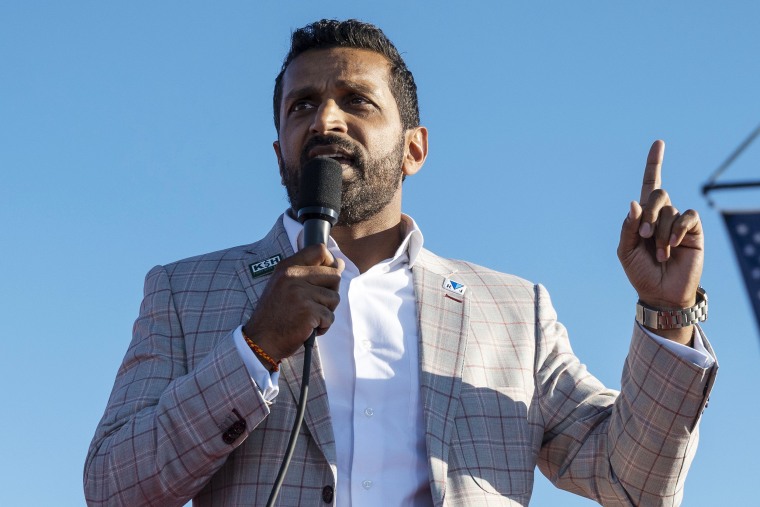
Kash Patel, who worked at the Justice and Defense departments during the Trump administration and who at one point was considered for the post of deputy director of the CIA, said in December that a second Trump administration would “go out and find the conspirators not just in government, but in the media” over the 2020 election. Trump lost the election to Biden, but Patel and Trump insist without evidence that the election was “stolen.”
Trump’s campaign has distanced itself from Patel’s remarks.
Fears among allies
Foreign allies, anxious about keeping their intelligence sources safe, already are worried about the implications of a second Trump term and could discreetly scale back how much information they share with their U.S. counterparts about intelligence gathering methods, former officials and lawmakers said.
The cooperation and trust between the U.S. and allied intelligence agencies have been forged over decades. Washington relies heavily on its foreign intelligence partners to help track terrorist threats, navigate international crises and prepare for possible conflicts. But Trump’s return to the White House could jeopardize those relationships, former officials said.
“I think some of our allies may withhold intelligence information on subjects such as Russia,” said a former career CIA officer who oversaw clandestine operations in Europe. “And they would do it very carefully. They would ratchet it back so it doesn’t look so obvious, for fear of retribution.”
Trump has been accused of having a cavalier attitude to sensitive or secret information, and is facing federal charges that he mishandled classified documents he kept after leaving the White House and then allegedly obstructed the government’s attempt to reclaim them. Prosecutors say Trump took more than 300 classified files to his Mar-a-Lago estate in Florida. The former president has vehemently denied any wrongdoing and called the case an attempt to undermine his re-election bid.

The allegations about Trump’s mishandling of classified information, and his consistent praise and refusal to condemn Russian President Vladimir Putin, would cause U.S. partners to think twice about relaying intelligence related to Russia, former officials said.
Protecting sources is a bedrock principle for all intelligence work, and no government would be ready to jeopardize that, the former CIA officer said.
“The one thing any intelligence community cares about most is source protection,“ the former officer said. “No ally is ever going to come out and say we’re going to turn off intel sharing, but a friendly service would be remiss if such source protection concerns are not of paramount concern, given Trump’s affinity for Putin.”
James Clapper, former director of national intelligence and former director of the Defense Intelligence Agency, said U.S. allies will be “apprehensive about sharing intelligence revelatory of their sources and methods, particularly if you have somebody that’s obviously pretty careless about protecting security information.”
No more ‘adults’
When Trump entered office in 2017, he arrived without having served in the military or any branch of government.
“As a result, he had no experience handling classified information or working with military, diplomatic, or intelligence programs and operations. Trump had traveled abroad but, by his own account, did not often read,” reads a history of presidential briefings published by the CIA’s Center for the Study of Intelligence.
Having publicly disparaged the intelligence agencies even before he was sworn in, Trump’s relations with the spy services have always been difficult. At times, intelligence officials who delivered analyses that did not fit the White House’s agenda were berated by angry aides, according to two former intelligence officers.
But during Trump’s time at the White House, senior figures in his Cabinet, military and in the intelligence community — dubbed the “adults in the room” — managed to steer him away from what they believed were ill-informed or risky ideas, sometimes by persuading him otherwise or delaying decisions.
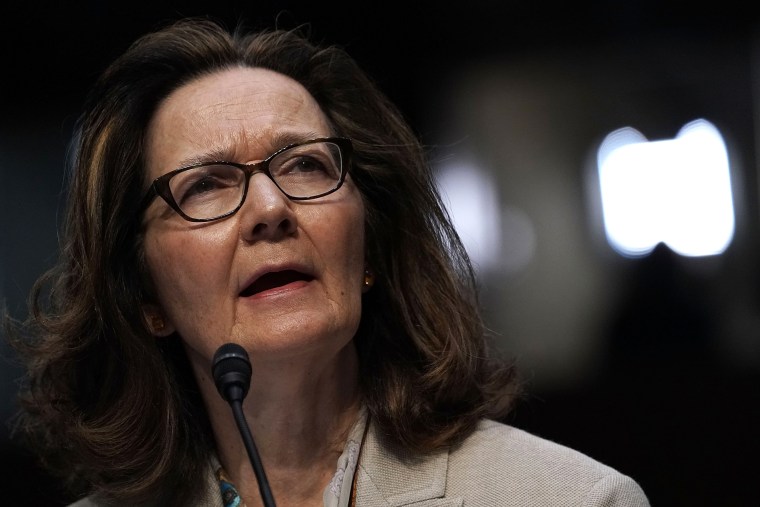
One of them was Gina Haspel, a career intelligence officer who served as CIA director in the tumultuous second half of Trump’s presidential term, from 2018-2021. She helped insulate the spy agency’s workforce from political pressure, according to former intelligence officials.
“She knew how to manage Trump, how to flatter him and how to call in her chips when the moment called for it,” said one former colleague.
Clapper called Haspel “one of the most impactful directors in the history of the agency simply because of how she protected it.”
But a career intelligence officer will likely not get the nod for the director’s job at the CIA in a second Trump presidential term, as Trump has signaled he wants deputies who have demonstrated strong political allegiance to him.
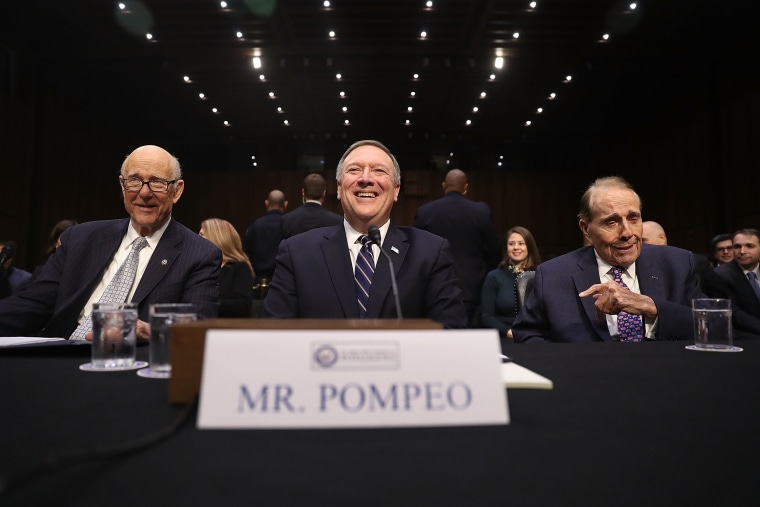
Trump’s supporters at the Heritage Foundation think tank and elsewhere are advocating that he shake up the federal bureaucracy by replacing tens of thousands of civil servants with political appointees in government agencies, which would include the 18 federal intelligence agencies. In the closing months of the Trump administration, the White House attempted such an effort with a new executive order but the Biden administration quickly reversed it.
“I think there will be more political appointees, but I don’t know how many more,” said one former official who served in the Trump administration and who is in close contact with Trump’s team.
The former official said it would be reasonable for Trump to assert control over the intelligence community in a second term through political appointees, to ensure the intelligence agencies carry out the president’s policies without bureaucratic subterfuge.
“No matter what side you’re on politically, you should want political control because we don’t want this country to become a security state,” the former official said.
The Heritage Foundation’s proposed outline for action if Trump is elected, titled “Project 2025,” calls for the president-elect to promptly choose a deputy director of the CIA, who would not need Senate confirmation, and could “immediately begin to implement the President’s agenda.”
“Additional appointees should be placed within the agency as needed to assist the Director in supervising its functioning,” the report states.
The document also calls for breaking “the cabal of bureaucrats in D.C.” by moving some directorates in the CIA outside of northern Virginia, where the headquarters is located.
Robert Litt, who served as general counsel for the Office of the Director of National Intelligence from 2009 to 2017, said inserting political appointees into the management of the spy agencies in unprecedented numbers could distort the way intelligence is analyzed and lead to illegal or ill-advised decisions.
“I think it would be a very, very bad thing for the intelligence community and for the nation if the intelligence community was dominated by a group of political loyalists,” he said.
“One is the risk that intelligence analysis will not be called down the middle,” Litt said. “And the other is the risk that the intelligence agencies will be directed to do things that are either unlawful or inappropriate.”
Worst-case scenarios
In a second Trump White House, China would remain the top priority for the intelligence agencies, as it was for the last Trump administration and the current Biden administration, said the former official close to Trump’s team. A mission center at the CIA dedicated to Iran likely would be restored, and a Trump White House would look to cut back on in-house analytical teams within ODNI, the former official said.
The Heritage document, echoing an argument often employed by Trump and his supporters, asserts that former intelligence officials have injected politics into the work of the spy agencies in an attempt to promote the idea that Trump’s campaign in 2016 allegedly colluded with Russia and to play down allegations of possible corruption against Biden’s son Hunter Biden.
The Heritage policy blueprint calls for security clearances to be revoked for any former intelligence officials who “discuss their work in the press or on social media without prior clearance” from the director of national intelligence. It also calls for an “audit” of all cases of “past politicization and abuses of intelligence information.”
Former intelligence officials are divided over whether a worst-case scenario — with the spy services targeting domestic political opponents — could take place, and if it did, how the intelligence workforce and courts would respond. Much will depend on whom Trump names as the leaders of the intelligence agencies and the Justice Department. Former Republican Rep. Devin Nunes, a staunch supporter of Trump who was an outspoken critic of the investigation into possible ties between the Trump campaign and Russia, is seen as a possible candidate for CIA director. John Ratcliffe, the former Texas congressman who served as director of national intelligence under Trump, could be asked to return to the DNI’s job.
One former senior intelligence official said for all its shortcomings, the intelligence community would not be easily converted into a domestic spying service, and that many of the career officers would refuse to follow unlawful orders.
“They would be pretty resistant to turning it on the American people,” the ex-official said.
A more likely scenario could be a steady degradation of the intelligence agencies, in which experienced staff resign or are sacked and morale declines, with unpredictable consequences for intelligence gathering and the country’s national security, the former official said.
Other former officials say Trump has never respected the norms and guardrails meant to safeguard America’s democracy, and that there is no guarantee he won’t venture into Nixonian territory.
“I would not say anything is off the table when it comes to Donald Trump, including the most potentially damaging and egregious violations of practice, if not law itself,” said John Brennan, who served as CIA director under President Barack Obama and is an outspoken critic of Trump.
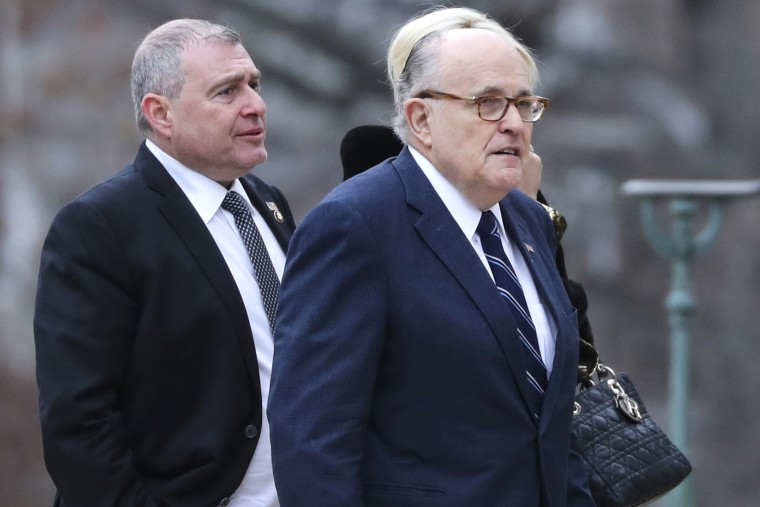
Former officials point out that Trump sent his personal lawyer, Rudy Giuliani, to Ukraine in a bid to dig up dirt on Biden, his political opponent. Next time, the former officials said, perhaps a similar mission would be handed to the CIA, though presented under the guise of legitimate intelligence gathering.
Miles Taylor, who worked as a senior official at the Department of Homeland Security during the Trump administration, said the secrecy that underpins intelligence work could also enable an administration to hide the true purpose of a particular order and make it extremely difficult for an employee to blow the whistle if they deem it inappropriate.
“A number of people at senior levels are very concerned that they will get asked to do things they consider unethical but not illegal,” Taylor said.
But unlike other parts of the government, there would be “few remedies to sound the alarm” because so much relevant information is classified, said Taylor, who has warned publicly of the risks of a second Trump presidency.
Contemplating a possible second Trump term, many intelligence officers are looking at securing assignments abroad or leaving for the private sector, Taylor said.
“A lot of them are thinking if Trump wins, it’s a really good time to move on,” he said.
